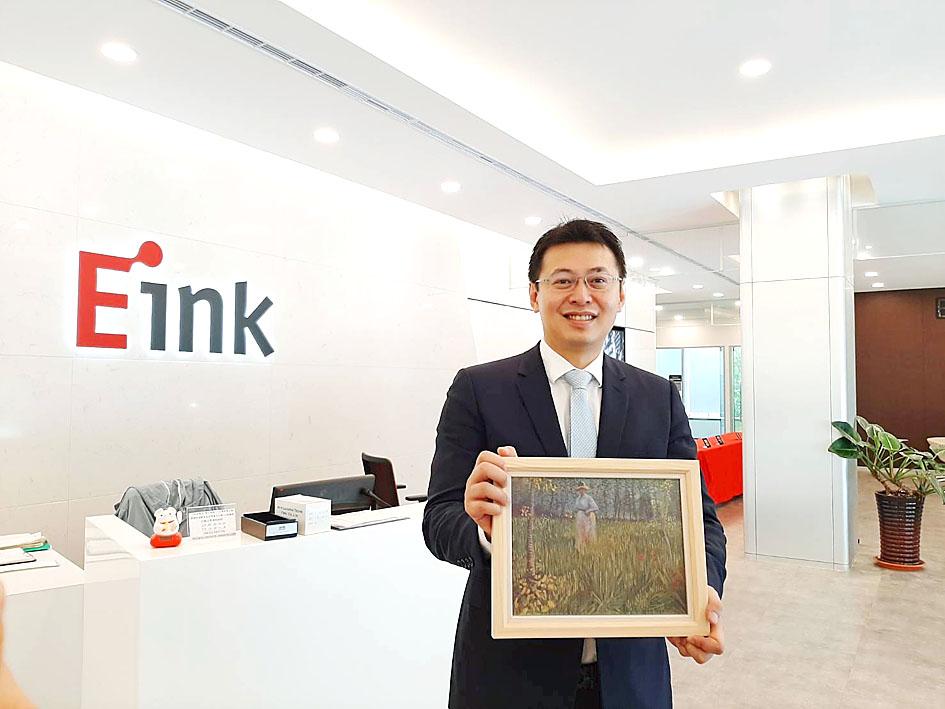E Ink Holdings Inc (元太科技), the world’s sole supplier of e-paper displays, yesterday said it was optimistic about revenue growth this year, but tight supplies of display driver ICs and flat-panel displays might cap its sales.
“For the whole of this year, we are positive about the business outlook. However, it will largely hinge on how much key components we can secure,” E Ink chairman Johnson Lee (李政昊) told investors via a teleconference in Taipei.
“So far, it looks like this year will be better than last year,” Lee said. “The second quarter [performance] will be very similar to the first quarter.”

Photo: Chen Mei-ying, Taipei Times
Customer demand is not an issue for E Ink, as demand has greatly exceeded what the company can supply. E-paper is used in e-readers, e-notes and retailers’ electronic shelf labels, replacing traditional paper.
“Many clients have started talks with us about next year’s capacity arrangements as most deals for this year have been settled,” Lee said.
To catch up with customers’ rising demand, E Ink said it plans to add four new production lines to expand capacity, mainly for electronic shelf labels, as well as invest in a new office building that would also include a production line.
The new office building would cost NT$1.91 billion (US$68.26 million), the company said.
The company expects capacity to grow multiple-fold after the new expansion plan is completed next year at the earliest.
The company raised its capital spending for this year to about NT$2 billion from the NT$1.5 billion it estimated in March.
E Ink’s net income soared 48 percent to NT$1.17 billion during the quarter ending March 31, compared with NT$787.26 million a year earlier.
Earnings per share increased to NT$1.03 from NT$0.69 in the same period last year, making last quarter the best first quarter in about eight years.
Gross margin climbed to 49.78 percent, compared with 46.23 percent in the first quarter last year.
E Ink expects its gross margin to trend down in the following quarters, eroded by price increases in key components.
“Our strategy is not to pass on the rising costs to customers, as the e-paper market is still in the nascent stage of expansion. Besides, we are the single source. We should not do this,” Lee said.
To boost e-paper’s penetration of the education market, E Ink has formed an e-paper industry alliance in Shanghai to promote e-readers and e-notes for students.
The company expects the alliance’s membership to double to 200 companies next year.
MediaTek Inc (聯發科), Inventec Co (英業達) and Innolux Corp (群創), as well as China’s Xiaomi Corp (小米), Lenovo Group Ltd (聯想) and Hisense Electric Co (海信), plan to join the alliance, E Ink said.

Zhang Yazhou was sitting in the passenger seat of her Tesla Model 3 when she said she heard her father’s panicked voice: The brakes do not work. Approaching a red light, her father swerved around two cars before plowing into a sport utility vehicle and a sedan, and crashing into a large concrete barrier. Stunned, Zhang gazed at the deflating airbag in front of her. She could never have imagined what was to come: Tesla Inc sued her for defamation for complaining publicly about the vehicles brakes — and won. A Chinese court ordered Zhang to pay more than US$23,000 in

Taiwan Semiconductor Manufacturing Co (TSMC, 台積電) yesterday said that its investment plan in Arizona is going according to schedule, following a local media report claiming that the company is planning to break ground on its third wafer fab in the US in June. In a statement, TSMC said it does not comment on market speculation, but that its investments in Arizona are proceeding well. TSMC is investing more than US$65 billion in Arizona to build three advanced wafer fabs. The first one has started production using the 4-nanometer (nm) process, while the second one would start mass production using the

A TAIWAN DEAL: TSMC is in early talks to fully operate Intel’s US semiconductor factories in a deal first raised by Trump officials, but Intel’s interest is uncertain Broadcom Inc has had informal talks with its advisers about making a bid for Intel Corp’s chip-design and marketing business, the Wall Street Journal reported, citing people familiar with the matter. Nothing has been submitted to Intel and Broadcom could decide not to pursue a deal, according to the Journal. Bloomberg News earlier reported that Taiwan Semiconductor Manufacturing Co (TSMC, 台積電) is in early talks for a controlling stake in Intel’s factories at the request of officials at US President Donald Trump’s administration, as the president looks to boost US manufacturing and maintain the country’s leadership in critical technologies. Trump officials raised the

From George Clooney to LeBron James, celebrities in the US have cashed in on tequila’s soaring popularity, but in Mexico, producers of the agave plant used to make the country’s most famous liquor are nursing a nasty hangover. Instead of bringing a long period of prosperity for farmers of the spiky succulent, the tequila boom has created a supply glut that sent agave prices slumping. Mexican tequila exports surged from 224 million liters in 2018 to a record 402 million last year, according to the Tequila Regulatory Council, which oversees qualification for the internationally recognized denomination of origin label. The US, Germany, Spain,